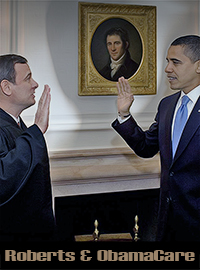| Execrable ObamaCare Ruling Offers Important Corrective for Conservatives and Libertarians |
 |
|
By Timothy H. Lee
Thursday, June 25 2015 |
This week, Chief Justice John Roberts and Justice Anthony Kennedy paradoxically discredited a Supreme Court whose legacy and popular standing they appear so desperate to sustain. In King v. Burwell, they joined the Court's four leftists in preserving federal ObamaCare subsidies despite the law's plain text that only states opting to participate in its schemes were eligible. In the words of dissenting Justice Antonin Scalia, "Words no longer have meaning." Foregoing the more common "I respectfully dissent," Scalia simply said "I dissent" in his unusually harsh condemnation of the decision: "We should start calling this law SCOTUScare. Perhaps the Patient Protection and Affordable Care Act will attain the enduring status of the Social Security Act or the Taft-Hartley Act; perhaps not. But this Court's two decisions on the Act will surely be remembered through the years. The somersaults of statutory interpretation they have performed ('penalty' means 'tax,' 'further [Medicaid] payments to the State' means 'only incremental Medicaid payments to the State,' 'established by the State' means 'not established by the State') will be cited by litigants endlessly, to the confusion of honest jurisprudence. And the cases will publish forever the discouraging truth that the Supreme Court of the United States favors some laws over others, and is prepared to do whatever it takes to uphold and assist its favorites." Beyond the immediate legal and political implications, however, this week's decision provides two important correctives for conservatives and libertarians going forward. But first, a brief reflection on the ruling's likely impact on the 2016 presidential race. Specifically, that the candidate most likely to suffer in the near term may be Jeb Bush, given his obvious association with the man who appointed Chief Justice Roberts to the Court. Already burdened by suspicion - whether fairly or unfairly - that he's too centrist in today's Republican Party, Bush's indirect association with Roberts could render him subject to voter anger and backlash against the decision. Any "mad as hell" reaction could favor a competitor perceived as more confrontational and less centrist or "establishment." Regardless of those immediate political consequences, however, this week's decision should forever retire conservatives' and libertarians' habitual condemnation of "judicial activism." To be clear, that's not to advocate that judges disregard their proper role as neutral interpreters of law rather than arrogant makers of law. After all, when judges disregard the plain text of laws or the Constitution, and instead substitute their personal political desires in overturning valid laws enacted through our representative democratic process, we veer dangerously toward a judicial oligarchy. On the other hand, undue deference to the other branches of government isn't necessarily better than insufficient deference. Both can be destructive and deviate from proper rulings based upon the text of laws and the Constitution. When, as in this week's ObamaCare decision, judges unduly refrain from overturning laws or administrative interpretations that contravene the plain meaning of statutes or the Constitution, they fail to perform their duty. Excess judicial restraint can undermine the Constitution, the proper separation of powers and our legal rights every bit as much as excess judicial activism. Second, this week's decision highlights an underemphasized distinction between judicial originalism and judicial textualism, which surprisingly often divides conservative and libertarian jurists and judicial theorists. The issue of flag burning provides an earlier illustration of the distinction, when textualist Justice Scalia ruled that it constituted free speech protected by the First Amendment. In contrast, the equally conservative but more originalist Chief Justice Rehnquist opined in dissent that flag burning could properly be prohibited. The two interpretive approaches typically lead to the same decision, but sometimes they diverge. In this case, Chief Justice Roberts and Justice Kennedy elevated legislative original intent to preserve federal subsidies, whereas Justices Scalia, Thomas and Alito more properly focused on plain text in voting to overturn them. As repugnant as this decision was, we shouldn't forget or disregard the many instances in which the current Court has reached better decisions for which we should be grateful. From finally affirming the individual right to keep and bear arms under the Second Amendment, to First Amendment victories such as last year's Hobby Lobby decision and Citizens United, to overturning state-sanctioned racial discrimination in the form of "affirmative action," to restraining Obama National Labor Relations Board and Environmental Protection Agency excesses, or even this week's earlier ruling preserving the property rights of raisin farmers whose crops were confiscated by the federal government, the good has outnumbered the bad. Nevertheless, the Roberts Court fetish for preserving ObamaCare at all costs is to be condemned. Conservatives and libertarians must also internalize the important lesson that we shouldn't necessarily favor "judicial restraint" over "judicial activism," as well as the importance of textualism versus fealty toward more arbitrary divination of legislative intent. |
Related Articles : |
























